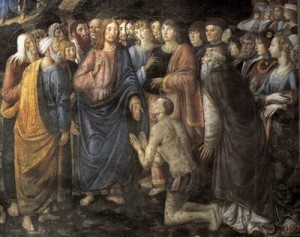 The beginning of Mark’s gospel contains a revealing and prophetic encounter between Jesus and a leper. We are told: “And there came a leper to Him, beseeching Him, and kneeling down said to Him: If Thou wilt, Thou canst make me clean. And Jesus having compassion on him, stretched forth His hand; and touching him, saith to him: I will. Be thou made clean” (1:41-42).
The beginning of Mark’s gospel contains a revealing and prophetic encounter between Jesus and a leper. We are told: “And there came a leper to Him, beseeching Him, and kneeling down said to Him: If Thou wilt, Thou canst make me clean. And Jesus having compassion on him, stretched forth His hand; and touching him, saith to him: I will. Be thou made clean” (1:41-42).
In His great love for the poor and humble, Christ stretched forth His hand, and so healed the man of his wretched malady. Here is the Good News in miniature: Jesus of Nazareth as the Anointed One who stretches forth His hand to save, cleanse, and heal.
It is no coincidence that the God-Man died upon a cross, arms widespread like the wings of an eagle. “He will overshadow thee with His shoulders: and under His wings thou shalt trust” (Psalm 91:4). From the cross, Christ’s stretched-forth hands overshadowed our sins. Even now, we huddle beneath His bloody pinions, trusting they will shield us from the Evil One, who prowls about for the souls of men.
Christ did not merely gesture at the leper, “waving away” his misery. The Lord rather touched him, felt his wretched body. Certainly this touch was the sweetest caress. Similarly, atop His cruciform perch, Christ embraced the wickedness of the world. Jesus’ substitutionary sacrifice was not a charade: from His throne on Calvary, the God-Man truly encountered mankind’s sin. “Him, who knew no sin, He hath made sin for us, that we might be made the justice of God in Him” (II Corinthians 5:21).
As we enter into Lent, it is worth pondering Christ’s stretched-forth hands, as they appear during His ministry and His passion. It seems His hands were always that way: stretched-forth. No doubt this oft-repeated gesture was symbolic of His radical self-giving.
The great scandal of Christianity is the loving condescension of an eternal and infinite God who became flesh and bone; and not just flesh and bone, but a servant among servants, meek and lowly in the extreme.
“For let this mind be in you, which was also in Christ Jesus: Who being in the form of God, thought it not robbery to be equal with God: But emptied Himself, taking the form of a servant, being made in the likeness of men, and in habit found as a man. He humbled Himself, becoming obedient unto death, even to the death of the cross” (Philippians 2:5-8).
Let this mind be in you. Lent is the season of discipline. It is an opportunity to take a half-step back from the daily bustle and strive after the mind of Christ. What is the mind of Christ but the mind of the servant? For “the foolish things of the world hath God chosen, that He may confound the wise; and the weak things of the world hath God chosen, that He may confound the strong” (I Corinthians 1:27).
We should never forget that we worship the Scourged God, the Pierced God, the Crucified God. Whenever we forget this precious and awesome reality, we forsake the mind of Christ and cannot properly call ourselves Christians. Jesus revealed that God is Love, and Love always seeks the good of the other, as Saint Paul illustrates in I Corinthians 13.
We see then that stretched-forth hands are apt symbols of Christian life, which is rooted in self-giving and self-sacrifice:
“But Jesus calling them, saith to them: You know that they who seem to rule over the Gentiles, lord it over them: and their princes have power over them. But it is not so among you: but whosoever will be greater, shall be your minister. And whosoever will be first among you, shall be the servant of all. For the Son of Man also is not come to be ministered unto, but to minister, and to give His life a redemption for many” (Mark 10:42-45).
The Lord stretched forth His hand to heal and cleanse; He stretched forth His hand to embrace the sins of the world, and so cast them away. Though we lack His authority, we can imitate His actions, and so become one with Him: “Jesus answered, and said to him: If any one love Me, he will keep My word, and My Father will love him, and We will come to him, and will make Our abode with him” (John 14:23).



